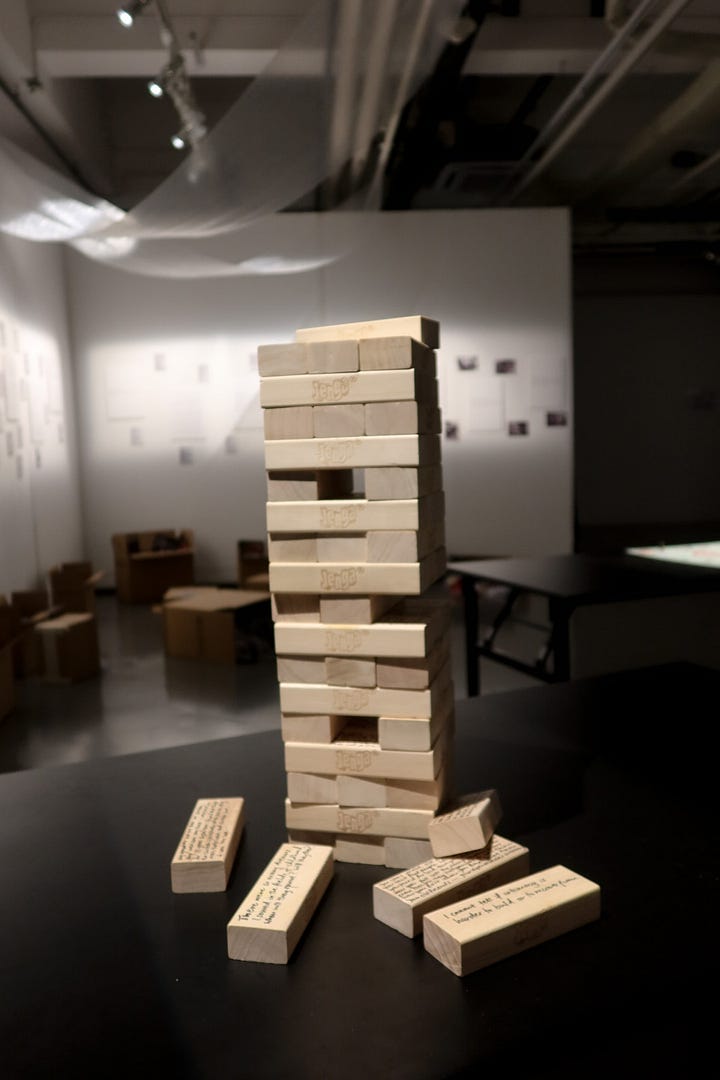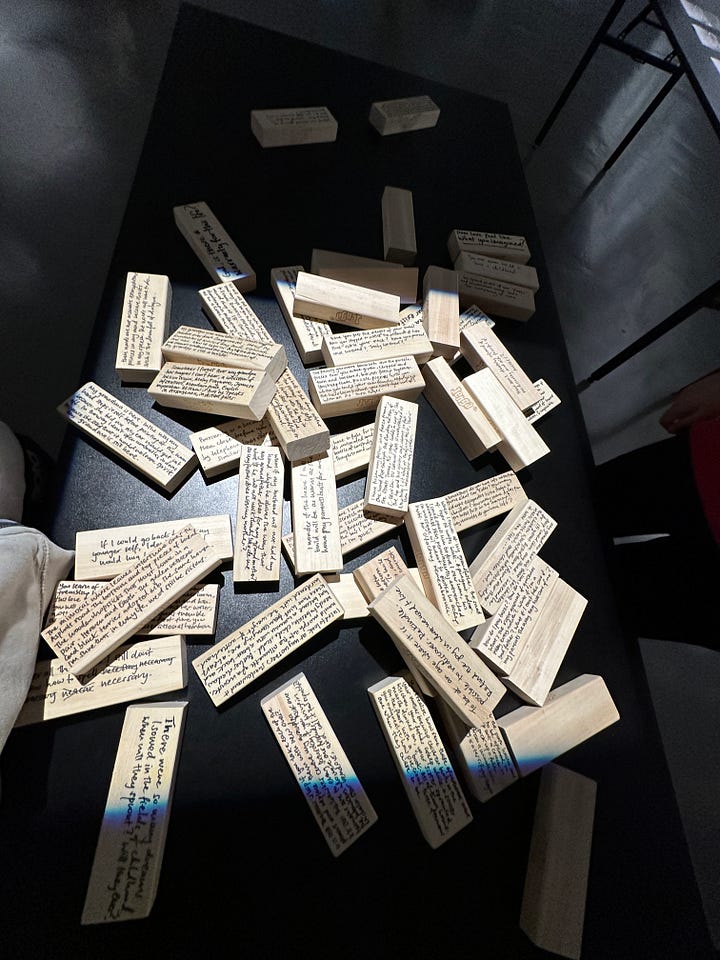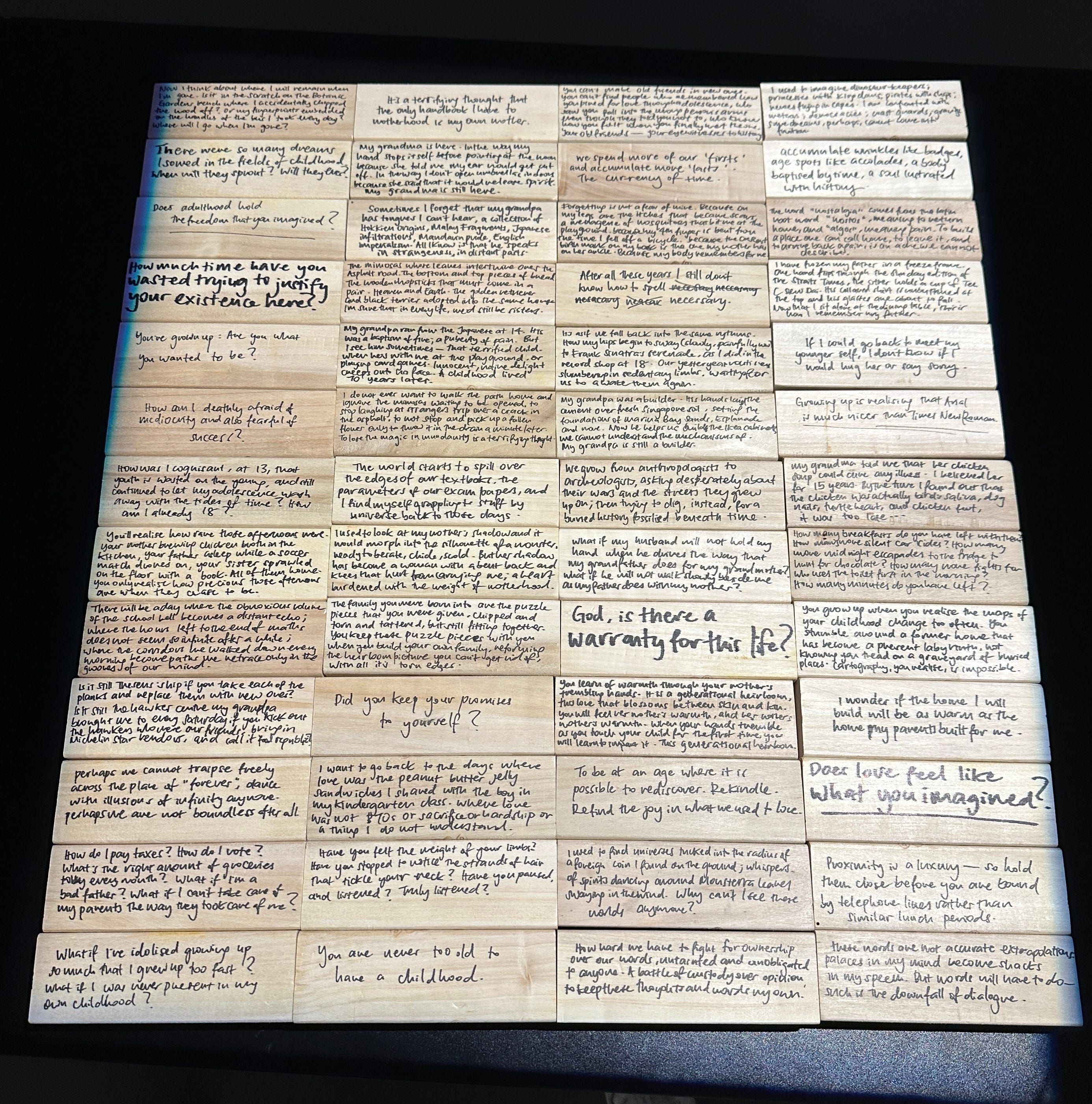




Many of us played Jenga when we were young. “Jenga” is a Swahili word meaning “to build.” That is what we are doing, isn’t it? We look to the future and build our dreams and hopes, but growing up is a process of having those visions break down as well. I sent out a google form a while back, asking some of my friends: “What about growing up are you most afraid of?” and took inspiration from their responses to rewrite Jenga. To read the writing, the audience had to risk the tower falling down. To grow up is to acknowledge that what we build will sometimes break down.
Initially, I had written each block thinking that each person would read only 2-3 blocks. I wrote each block with care and intention, knowing that the reading of these blocks are randomised, under the assumption that every block would be read by different people. But in the end, I was surprised that almost everyone who came to the table read every single block. I think, because of a fear of noise, a lot of people didn’t play the actual Jenga game, but deconstructed the blocks from the top or lay it down carefully. It was quite funny watching people figure out how to interact with the blocks without making a sound.
Even though I wouldn’t count this as my favourite piece of work from myself, it was the one that everyone liked the most. I think it was because the audience demographic were mainly teenagers and we like the hard-hitting, instantly gratifying pieces of writing. This piece of work definitely is not something I would usually write, but it pushed me out of my comfort zone because I had only so much space to tell a story, ask a question, probe for a thought. In the end, I’m quite happy with how it was received by everyone. I saw these blocks on many many people’s Instagram stories — each person resonated with something different. That made me smile.
Jenga
I realise some blocks are difficult to read… so here is the typed version for archival purposes, even though it defeats the purpose of the game.
I used to look at my mother’s shadow and it would morph into the silhouette of a monster, ready to berate, to chide, to scold. But her shadow has become a woman with a bent back and knees that hurt from carrying me; a heart burdened with the weight of motherhood.
I cannot tell if intimacy is harder to build or recover form.
I used to imagine dinosaur-keepers; princesses with kingdoms; pirates with ships; heroes in capes. I was certain that I would be them one day. I am confronted with meteors; democracies; coast guards; gravity. Some dreams, perhaps, cannot come to fruition.
The mimosas whose leaves intertwine over the asphalt. The bottom and top pieces of bread. The wooden chopsticks that must come in a pair. Heaven and earth. The golden retriever and black terrier that are adopted into the same house. I’m sure in every lifetime, we’d still be sisters.
Sometimes I forget that my grandfather has tongues I don’t hear, that his mouth is a collection of Hokkien origins, Malay fragments, Japanese infiltrations, Mandarin pride, and English imperialism. All I know is that he speaks in strangeness, in a distant past.
There were so many dreams I sowed in the fields of childhood. When will they sprout? Will they ever?
You are never too old to have a childhood
My grandmother told me that her chicken soup could cure any illness. I believed her for 15 years. By the time I found out that the chicken was actually bird’s saliva, dog nails, turtle heart, and chicken feet, it was too late…
How do I pay my taxes? How do I vote? What is the right amount of groceries to buy each month? What if I’m a bad father? What if I can’t take care of my parents like they took care of me? What if I lose myself?
I wonder if the home I build will be as warm as the home my parents built for me.
proximity is a luxury. hold them close befor you are bound by telephone lines and not similar lunch periods.
what if my husband will not hold my hand when he drives the way that my grandfather does for my grandmother? What if he will not walk slowly beside me as my father does because of my mother’s crippled right foot?
There will be a day where the obnoxious volume of the school bell becomes a distant echo in our heads; where the hours left to the end of maths lesson does not seem so infinite after all; where the corridors we walked down every morning become paths we retrace only in the grooves of our minds.
Have you felt the weight of your limbs? Have you stopped to notice the strands of hair that tickle your neck? Have you paused, and listened? Truly listened?
What if I’ve idolised growing up so much that I grew up too fast? What if I was never present in my own childhood?
I want to go back to the days where love was the peanut butter jelly sandwiches I shared with the boy in my kindergarten class. where love was not BTOs or sacrifices or hardship or a thing I don’t understand.
perhaps we cannot traipse freely across the plane of “forever”; dance with illusions of infinity anymore. perhaps we are not boundless after all.
If I could go back to meet my younger self, I don’t know if I would hug her or tell her that I’m sorry.
The family you were born into are the puzzle pieces that you’ve been given, chipped and torn and tattered, but still fitting perfectly together. You keep these puzzle pieces with you when you build your own family, reforming the heriloom picture you cannot get rid of, with all its torn edges.
Now I think about where I will remain when I’m gone. Is it in the scratch on the Botanic Gardens bench where I accidentally chipped the wood off? Or my fingerprints embedded on the handles of the bus that I took every day? Where will I go when I’m gone?
these words are not accurate extrapolations. palaces in my mind become shacks in my speech. but they will have to do — such is the downfall of dialogue.
You can’t make old friends in new ones. You can’t find people who remember how you pined for love through adolescence, who saw you fall into the wrong person’s arms even though they told you not to, who knew how you felt when you finally met the one, who tease you about all of it now. Your old friends – your eyewitnesses to your history.
I have frozen my father in a freeze frame. One hand flips through the Sunday edition of the Straits Times, the other holds a cup of Teh C Siew Dai. His collared shirt is unbuttoned at the top, and his glasses are about to fall. Now that I sit alone at my dining table, this is how I remember my father.
You learn of warmth through your mother’s trembling hands. It is a generational heirloom, this love that blooms between skin and kin. You will feel her mother’s warmth, and her mother’s mother’s warmth. When your hands tremble as you touch your child, you will learn to impart it. This generational heirloom.
My grandpa was a builder. His hands lay the cement over fresh Singapore soil, laying the foundations of Marina Bay sands, Esplanade. Now he helps us build the ikea cabinets we cannot understand the mechanisms of. My grandpa is still a builder.
I do not ever want to walk the path home that I’ve walked a thousand times and ignore the mimosas waiting to be opened, to stop laughing at strangers trip over a crack in the asphalt, to not stop and pick up a fallen flower only to throw it into the drain a minute later. To lose the magic in mundanity is a terrifying thought.
You’ll realise how rare those afternoons were. Your mother brewing chicken broth in the kitchen, your father asleep while a soccer match drones on, your sister sprawled on the floor with a book. All of them, home. You only realise how precious those afternoons are when they cease to be.
how hard we have to fight for ownership over our words, untainted and unobligated to anyone. A battle of custody over opinion, to keep these precious thoughts my own.
Growing up is realising that Arial is nicer than Times New Roman
Is it still Theseus’ ship if you take each of the planks and replace them with new ones?
Is it still the hawker centre hat my grandpa brought me to every Saturday if you kick out the hawkers who were my grandpa’s friends, bring in Michelin star vendors I can’t recognise, and call it ‘food republic’?
We spend more of our firsts and accumulate more lasts. The currency of time.
how was I cognisant, at 13, that youth is wasted on the young, and still continued to let my adolescence wash away with the tides of time? How am I already 18?
The word nostalgia comes from the latin root word, “nostos”, meaning to return home, and “algos”, meaning pain. To build a place one can call home, to leave it, and to arrive back again, is an ache we cannot describe.
You grow up when you realise the maps of your childhood change too often. You stumble around a former home that has become a present labyrinth, wondering where the Mama shop is, not knowing that you tread on a graveyard of buried places. Cartography, you realise, is impossible.
How am I deathly afraid of mediocrity and also fearful of success?
The world starts to spill over the edges of our textbooks, the parameters of our exam papers, and I find myself grappling to stuff the boundaries of my universe back to where it was.
It’s a terrifying thought that the only handbook I have to motherhood is my own mother.
The forevers I have promised form a pile that has flickered and faded away under the chokehold of time.
My grandma is here. In the way my hand stops itself before pointing at the moon because she told me my ear would get cut off. In the way I don’t open umbrellas indoors because she said that it would release spirits. My grandma is still here.
Does love feel like what you imagined?
When I think of my grandfather, the smell of tiger balm wafts back. A pungent odour. I could smell him before I saw him, his wrinkled skin permanently entrenched in massage oil meant to soothe his aching limbs. An olfactory remembrance.
My grandfather ran from the Japanese when he was 14. His was a baptism of fire; a puberty of pain. But I see him, sometimes – that terrified child. When he’s with me at the playground, or playing card games. Innocent, naive delight that creeps onto his face. A childhood that could only be lived 70 years later.
You’ve grown up: are you what you wanted to be?
How much time have you wasted trying to justify your existence here?
forgetting is not a fear of mine. because on my legs are the itches that became scars; a menagerie of mosquitos that bit me at the playground. because my fourth finger is slightly bent from the first time I fell off a bicycle. because of the crescent birth mark on my back that my mother, coincidentally, has on her ankle. because my body remembers for me.
it’s almost as if our feet fall back into the same rhythms. how my hips begin to sway (slowly, painfully now) to Frank Sinatra’s serenade, as I did in the record shop at 18 years old. our yesteryear routines slumbering in sedentary limbs, waiting for us to awake them again.
to be at an age where it is possible to rediscover. rekindle. refind the joy in what we used to love.
accumulate wrinkles like badges, age spots like accolades, a body baptised by time, a soul lustrated with history.
God, is there a warranty for this life?
we grow from anthropologists to archeologists. asking them about their wars and the streets they grew up on; then trying desperately to dig, instead, for a buried history fossilised beneath time.
How many breakfasts do you have left with them? How many more silent car rides? How many more midnight escapades to the fridge to hunt for chocolate? How many more fights for who uses the toilet in the morning? How much time do you have left?
I used to find universes tucked into the radius of a foreign coin I found on the ground; whispers of spirits dancing on the monsterra leaves swaying in the wind. Why can’t I see into these worlds anymore?





"Even though I wouldn’t count this as my favourite piece of work from myself, it was the one that everyone liked the most"
welcome to making art. jialat.